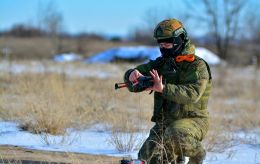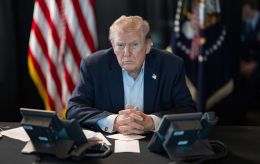Vance proposes freezing Russia-Ukraine war along current front line
 Photo: US Vice President J.D. Vance (Getty Images)
Photo: US Vice President J.D. Vance (Getty Images)
US Vice President J.D. Vance says the United States has made a very clear offer to Russia and Ukraine on the path to a peace agreement, and now it's time for them to either say yes or the United States will withdraw from this process.
Vance said that both Ukraine and Russia would have to give up some of the territory that each side currently controls.
"There are going to have to be some territorial exchanges," Vance told reporters in India after a tour of the Taj Mahal.
According to him, the border may not be the same front line as it is now. However, to stop the killing, both sides need to "put down their weapons, to freeze this thing and to get on with the business of actually building a better Russia and a better Ukraine."
"The current lines, somewhere close to them is where you’re ultimately, I think, going to draw the new lines in the conflict," he said.
Vance said he is optimistic about the talks, adding that he believes all sides have been negotiating in good faith so far.
US demands
According to Bloomberg, freezing the conflict along the existing battle lines would be a much greater sacrifice for Ukraine. Kyiv seeks to regain all the territories in the east and south of the country seized by Russia since 2014, including Crimea, and after a full-scale invasion in February 2022.
According to Bloomberg, the US is ready to recognize Russia's control over Ukraine's Black Sea peninsula and ease sanctions against Moscow as part of a potential peace deal. However, Ukrainian President Volodymyr Zelenskyy said that his country does not recognize Russia's occupation of Crimea, which is internationally recognized as Ukrainian territory.
Last week, US President Donald Trump warned that he was ready to abandon efforts to end the war in Ukraine if a deal is not reached soon. His envoy, Steve Witkoff, will travel to Russia at the end of the week after having already visited Vladimir Putin three times and calling the last meeting convincing.
Talks scheduled for April 23 in London between top officials from the US, Ukraine, and major European powers were downgraded to technical-level meetings after US Secretary of State Marco Rubio postponed his visit.


